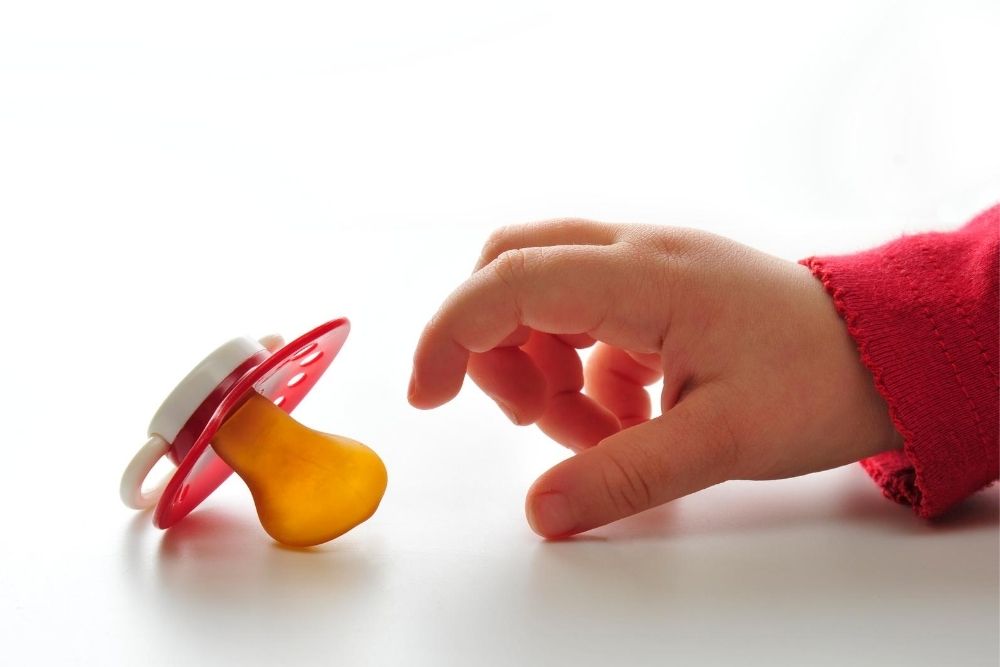A baby smiling as they fart is undeniably cute that you can’t help but giggle. The sight of a baby all bundled up and fartings is hilarious and adorable at the same time.
Yet, something most parents never really wonder is why babies smiley as they fart. Are you wondering what makes them flash that adorable toothless smile right after they pass a bit of gas? Let’s find out!
What Makes A Baby Gassy?
Let’s cover what makes a baby gassy, to begin with. A majority of the gas that a baby passes is from their mother’s diet or the formula’s contents. Exactly like adults, babies are affected by the values in food that any digestive tract gassy.
For instance, broccoli contains high amounts of sulfur which makes people gassy and has poor smelling gas. If mom eats broccoli then the baby is getting a good dose of sulfur too.
The other main reason is in the way infants nurse or bottle-feed. They tend to suck in a lot of air while they gulp down milk. This makes their tummies become full of air.
If it isn’t 100% relieved during a solid burp session after feeding, they can become gassier. Lastly, infants become gassy due to their underdeveloped digestive system.
Having an infant digestive system makes an environment where whole foods pass too quickly. It’s not fully digested, causing them excess gas in their intestines until it safely passes. Gas and a big smile – such relief for them!
There are other causes like hypersensitivities to food or formulas, and it’s important to recognize if your baby isn’t feeling well because of what they ate. Switch it when necessary and assisting their needs.
Later we’ll cover how to comfort a gassy baby.
Do Pacifiers Help With Gas?
Pacifiers do help with gas and an upset stomach. When a baby is overloaded by a fat they gain from hindmilk through a process called lingual lipase, their intestines can become upset trying to break this excess fat down in the digestive tract.
View in gallery
In the womb, babies are naturally always sucking, swallowing, and initiating the feeding motions. This is to get them ready for breastfeeding directly after birth.
Once a baby is outside of their mother’s womb, they’ll mimic how they did this in the womb to comfort themselves – naturally so.
Mothers who don’t use pacifiers and strictly breastfeed will want to give the baby her breast each time baby wants to relax or comfort themselves. This can result in an imbalance feeding routine, thus giving the baby too much fat to break down.
By offering a pacifier, parents extend support to the baby’s natural soothing rhythm outside of food intake. This helps establish a healthy balance of digestive enzymes from not over activating enzymes from food digestion.
- GLOWS AT NIGHT - These night pacifiers glow in the dark, making it easy for you to locate quickly at night without any stumbling and searching, so baby can sleep better.
- COMFORTABLE DESIGN – These cute pacifiers for babies are fun and functional. The curved shield with wide openings keep baby comfortable and allow baby’s skin to breathe.
- SILICONE NIPPLE – The BPA-free silicone nipple is a signature MAM pacifier design, with silky SkinSoft material and a symmetrical shape thats ideal for jaw and teeth development.
- STERILIZING STORAGE CASE - Add water and pop into the microwave to sterilize MAM pacifiers in just 3 minutes. No separate sterilizer means fewer baby items to take on the go!
Prices pulled from the Amazon Product Advertising API on:
Product prices and availability are accurate as of the date/time indicated and are subject to change. Any price and availability information displayed on [relevant Amazon Site(s), as applicable] at the time of purchase will apply to the purchase of this product.
It also keeps their gas at bay and the endorphins that help them relax at an all-time high.
Even though many parents don’t offer their babies a pacifier, since it’s up to each parent alone. Parents who do choose to offer their infant a pacifier don’t have to feel guilty towards doing so. It’s helpful for providers, and baby in the long run.
How Do You Comfort A Baby With Gas?
Gas relief is something that should be researched beforehand by parents of newborns. It can cause worry when the signs are recognizable. Upset tummies caused by gas are super common among infants before 6 months of age.
Comforting their baby when an episode of gas is active, or even taking preventive measures if a baby has a history of fussiness due to gas can make the world a much brighter place for everyone.
Give your baby food before they’re too hungry
Get to know the hunger cues that your baby gives. You can usually tell even when they make certain motions or noises when they start to get hungry. Babies swallow air when they’re hungry crying, resulting in more gas.
Maintain proper airflow during feedings
Improper latching during breastfeeding can cause your baby to suck in more air during every feeding. But, whether your baby is breastfed or bottle-fed, position during feeding is the most important thing.
Make sure that your baby is sitting upright when having a bottle, especially.
For babies who take bottles, don’t overshake the bottle. Make sure it’s full of milk at the nipple, and try anti-gas nipples to ensure your baby is getting the correct air-flow that matches the ability to swallow milk at an optimal rate.
- Nipple features 1 hole ideal for newborns and breastfed babies of all ages
- Clinically proven to reduce colic
- Compatible with all Philips Avent Classic bottles
- BPA Free. Easy latch on, Ribbed texture prevents nipple collapse, Proven anti colic system
- Dishwasher safe
Prices pulled from the Amazon Product Advertising API on:
Product prices and availability are accurate as of the date/time indicated and are subject to change. Any price and availability information displayed on [relevant Amazon Site(s), as applicable] at the time of purchase will apply to the purchase of this product.
Be sure to burp your baby as long as necessary
The simplest thing in the book can give the biggest relief. If a baby doesn’t get a solid burp session after eating, they’ll have air stuck in their tummies from mealtime.
View in gallery
Drinking in some air with their meal is unavoidable, but they shouldn’t have to sit through the consequences of this.
That’s when we come to the rescue, sometimes burping for one lengthy session, or two separate burping sessions close together can greatly reduce gas due to swallowing air while eating.
Infant gases, gripe water, and infant probiotics
If you offer your baby infant gas drops, look for the brand that contains the least amount of preservatives, additives, and dyes as possible. This will sit the best with most babies. Though infant gas drops don’t work for every baby.
Probiotics are essential to optimal gut function, especially in infants. The first five years of a baby’s life are spent developing their gut flora that will affect the rest of their lives.
Probiotics are an amazing natural way to encourage optimal digestion. Probiotics in the gut assist in breaking down foods in the correct manner, helping the gut secrete the correct type of acids and juices.
They’re naturally found in fermented foods and can be offered to babies once they can eat solid foods.
Infant massage and baby bicycle
Baby bicycle is a great way to move gases through the GI tract at any time of the day. To perform a bicycle with your baby, simply lay your baby on their back motioning their legs in a cycling motion.
Your baby is sure to smile while farting doing this activity.
In India, babies are rubbed down with coconut oil for the first few weeks of life. This is to nourish and support their internal organs.
View in gallery
Infant massage is a powerful way to support your baby’s whole body functions, making it possible for less gas. Massages directly help your baby pass their gas physically too.
If breastfeeding, check your own diet
If your baby seems extra upset after eating, it’s possible that some kind of food you have been consuming is passing through breastmilk, upsetting their tummy.
You can always get more guidance from a breastfeeding expert, nutritionist, or your baby’s pediatrician to pin-point the specific upsetting food.
Tummy time
Tummy time will strengthen your baby’s upper body and relieve discomfort from gas at the same time. Putting direct pressure on a baby’s tummy will dislodge gas stuck in their intestines.
Babies need help stretching out their tummy regions since they’re so used to being in the womb position. Twenty minutes of tummy time is plenty enough to help the baby out.
Conclusion
One thing that all parents can agree on is that babies are adorable when they smile from farting, especially when you snuggle them up in your arms. It seems louder than everything in the room!
We can’t help but laugh when this happens. But, in all seriousness, a gassy tummy can get quite uncomfortable if it’s not relieved.
Many infants will suffer from more spitting up and discomfort than necessary if they aren’t properly burped after guzzling down their milk.
There are plenty of good practices that you can implement to take care of infants who prove to be extra gassy. From extra burping to switching your baby’s formula as needed, it’s worth it to figure out the cause of a baby who doesn’t seem as happy as they could be.
Sources
Have a Gassy Baby? What to Know About Infant Gas Symptoms, Remedies and Causes
15 Things To Know About The Baby’s Farts






